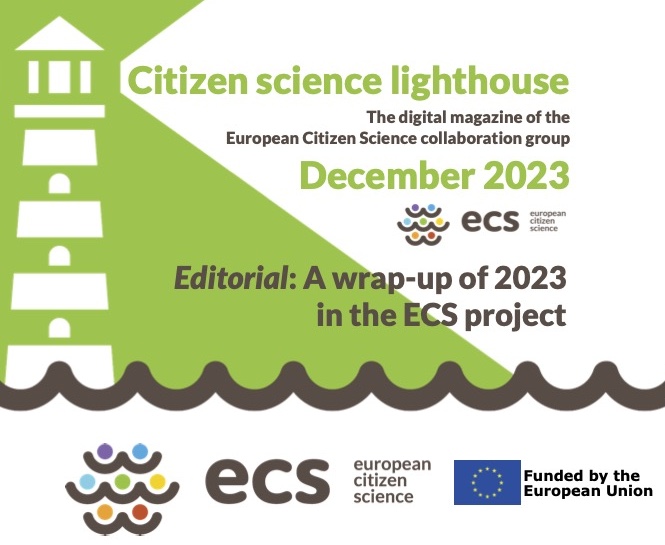
A wrap-up of 2023 in the ECS project
Claudia Fabó Cartas
Dec. 1, 2023, 9:18 a.m.
Author: Claudia Fabó Cartas
Photo: First ECS project meeting, Barcelona, 18-19 July 2023
Dear reader,
Whether you joined our citizen science journey from the beginning or came aboard the Citizen science lighthouse later on, we hope that you are enjoying the reads so far. As we bid farewell to the fourth and last issue of this year’s magazine, we are thrilled to share a wrap-up of some of the ECS project’s 2023 activities that might be of interest to you.
The main goal of ECS is to expand and strengthen the European citizen science community. As such, the project aims both to strengthen existing links and to expand the community by bringing new people and actors into citizen science. A part of this was establishing the ECS Collaboration Group and setting up a calendar of meetings to promote knowledge sharing and foster exchange between projects around topics of common interest in citizen science. The cluster event that took place on 3rd July involved projects, networks and European Commission representatives to engage in discussions centred around a unifying theme in the field. The title of this year’s cluster event was “Fostering the Higher Education Sector in Europe: The role of citizen science in transforming universities”. Missed the event? The recording is available here and a short report is on the horizon.
The call to create a network of 28 citizen science ambassadors published before the summer attracted many candidates. So far, 23 citizen science ambassadors are engaged in this network (see here) and are ready to raise awareness about citizen science and spread and strengthen it across Europe. Through a second round of the call the project aims to expand the network to five more countries. Join the network!
On the technical side: The eu-citizen.science platform continues being developed during ECS, adding new services and functionalities to the platform through co-design. We have decided on the co-design methodology to follow and carried out the first round of co-design workshops with members of the wider citizen science community. Three new functionalities came out: an interactive project map, an enhanced platform search engine, and a revamped event section, both in user experience and functional logic. The platform launched on 27th July with an online event. Dive deeper into the co-design process and the new platform features by watching the recording (here). You can also read on the ECS co-design on the platform (here), or check one of the project deliverables on the methodology (coming soon).
A big project effort is dedicated to creating the European Citizen Science Academy (ECS Academy) to support and enhance education and learning about citizen science. During 2023, ECS has created a network of educators and trainers in citizen science. Following an open co-production process with the network (including a survey, online meetings and workshops, and collaborative document editing) ECS has prepared the groundwork for what the ECS Academy will become. It will have different parts: a digital space to provide training, the network of educators and trainers, and the creation and delivery of training as such. New and exciting developments will happen during 2024!
Hold on, there is more: As in any other big projects, ECS has had quite some work behind the scenes. Soon we will share some of these with you in the form of deliverables (i.e. reports) that will be openly accessible on the Zenodo community of the project, here. These are some of them:
One of the objectives of the project is to better align data infrastructures to the needs of citizen science, and improve open science practices employed by citizen science initiatives. Work has been done to map and review experiences in co-design and co-development of data services in citizen science projects. This culminated in a best practices report focusing on lessons learned from past and ongoing projects to establish best practices for different states of design and development.
The project has also defined an ECS common strategy for policy engagement involving all project organisations. National priorities in the countries represented in the project were identified. Building on these, we set five overarching policy priorities that we will focus on in ECS policy engagement activities. This process and its results are explained in another deliverable.
Lastly, a line of work in ECS is dedicated to investigating the impact pathways of the activities in the project and its wider citizen science context. That is, ECS also aims to look beyond the horizon of the project activities to investigate causal chains and inter-relations of the impact of citizen science in Europe on six areas around science, society and economy. The plan on how to approach and implement impact assessment throughout ECS is detailed in a deliverable.
In our quest for increasing the participation of citizens from all walks of life in citizen science, this year saw us ensuring that we adopt an intersectional inclusive perspective in the project activities and in involving participants – an ongoing effort. For this, we have linked with sister projects and ECSA working groups and have made inclusiveness an integral part of the project day-to-day discussions. Some activities are underway, such as the engagement of public libraries to organise citizen science activities. As we navigate this area, rest assured that we will keep you posted on our activities and findings.
So here’s to you, for being part of this journey – hoping that some of these reports and developments will spark your curiosity. As the sun sets on 2023, we look forward to new horizons, new challenges and new learnings. Until then, we wish you a nice wrap-up at your end too.
All the best,
Claudia Fabó Cartas
ECSA project officer and ECS project manager